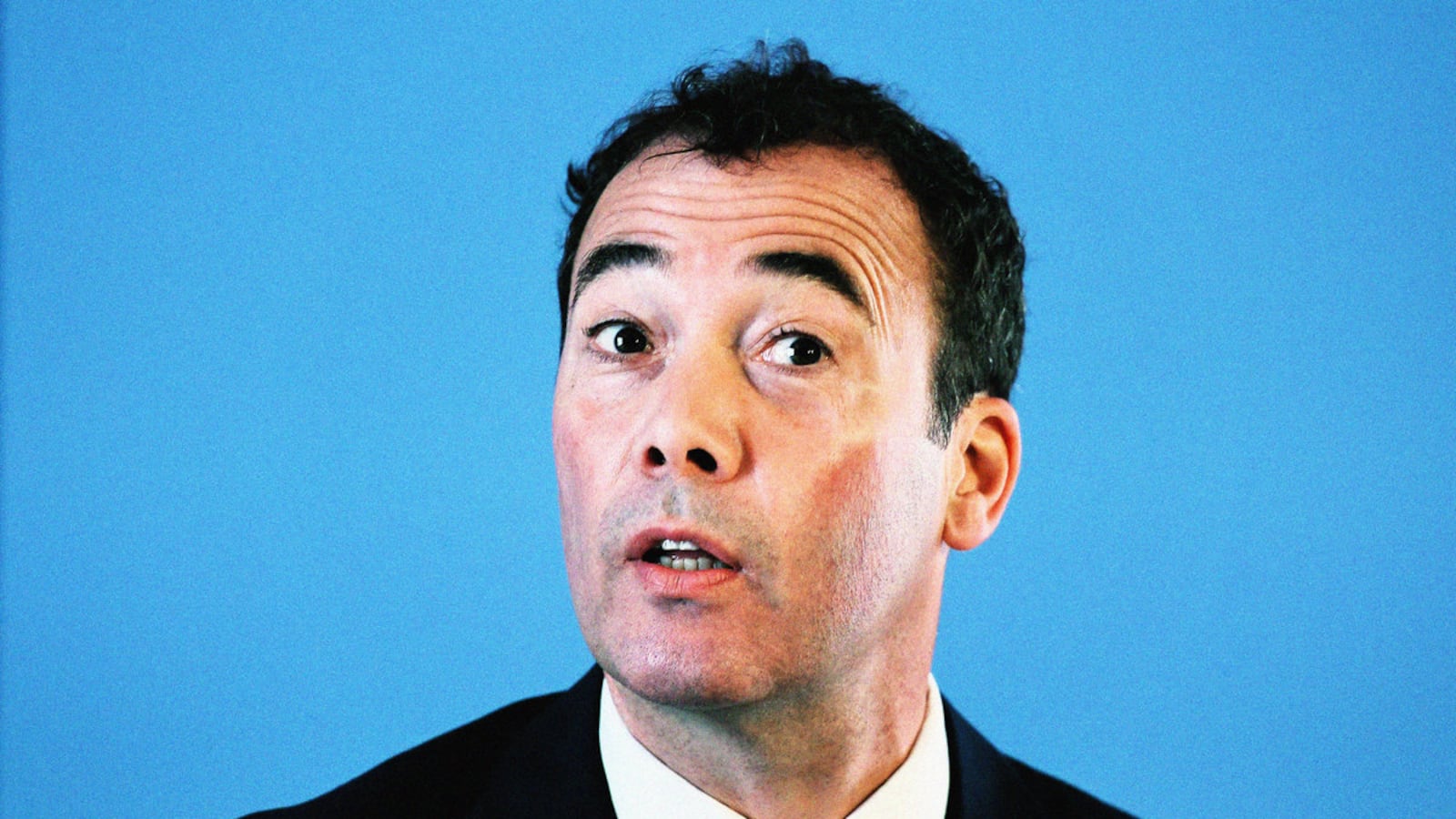In an interview with the newspaper he’s about to take over, Will Lewis set his goal for The Washington Post in plain terms: continued growth.
“We’re going to expand. We’re going to get our swagger back,” Lewis told the Post in November, days after his appointment was announced. “I know that right now is not our greatest time, but we’re going to grow again. And we’re going to get that confidence back and that swagger back. I can tell you that with absolute confidence.”
How far that confidence will carry him at the Post remains a key question for the newsroom as the newspaper Lewis will oversee beginning Jan. 2 is a far cry from the upper echelons of success it once reached.
“It’s a very grim mood right now,” a Post national reporter told The Daily Beast. The sentiment comes after a year of chaos at the Washington institution, one that has been bookended by steep job cuts; the departure of a dismally regarded publisher and the naming of two new ones; and a mass bleeding of talent, both through departures and buyouts, leaving the newsroom bereft of some institutional knowledge.
The Daily Beast spoke to five current Post staffers who described a broken newsroom, one drained of talent and exhausted by internal conflict. The Post will face its second consecutive year of financial losses, according to The New York Times, and it met its 240-person target for voluntary buyouts at the eleventh hour, after threatening staffers with layoffs. The conundrums now facing Lewis have rankled the newsroom—one whose union spent about 18 months negotiating a new contract—and have left it potentially ill-equipped as it barrels into a consequential presidential election year.
“The contract is just step one,” Washington Post Guild unit co-chair and local reporter Katie Mettler told The Daily Beast. “Trust is not earned overnight. Trust is earned over time. While we are grateful to be starting a new year with a contract in place, and with new leadership that we hope will be steady, there’s a lot of harm that’s been done over the last couple of years and especially over the last six weeks.”
“Will Lewis is going to come into a newsroom that’s already working at 100 percent and now has to work harder,” another Post staffer said.
The Post did not respond to detailed questions regarding the state of the newsroom ahead of 2024, and it declined to make interim CEO Patty Stonesifer, or executive editor Sally Buzbee available for an interview. A Post spokesperson—who also directed specific Lewis inquiries to his current employer, The News Movement—wrote in an emailed statement that “the decision to offer voluntary packages to employees across the organization was designed in hopes of averting more difficult actions such as layoffs—a situation we were united in trying to avoid."
The Washington Post entered the year on unsteady footing. Then-publisher Fred Ryan abruptly announced in December 2022 the paper’s plans to lay off a single-digit percentage of staff, leaving the newsroom rattled. The paper had just shuttered its Sunday magazine, prompting 10 layoffs, and the newsroom was reeling from a year in which staffers publicly butted heads with both management and each other.
The eventual slashings came in January, a more tempered cut than management had initially announced: 20 staffers were pink-slipped through the shuttering of its video game vertical Launcher and its child-focused section KidsPost. But there were also some noteworthy departures: Award-winning reporter Robert Samuels left the paper in March for The New Yorker, congressional reporter Camila DeChalus left for CNN, top culture editor David Malitz left for The New York Times, and managing editor Cameron Barr retired in June, among other exits.
June also brought about the headline-garnering announcement Post staffers had anticipated for some time: Fred Ryan’s departure as publisher. In his farewell memo, Ryan complimented his nine years helming the paper and helping it become a “global news operation,” one he wanted his replacement to advance. Ryan left the paper in August.
That interim replacement came in Stonesifer, a confidant of Amazon founder and Post owner Jeff Bezos. She initially won over staffers for the simple fact of not being Fred Ryan, along with her open nature and assurances of no further layoffs, staffers told The Daily Beast at the time.
“There is no plan for additional layoffs at this time and no plan for ‘Let’s look at this down the road,’” Stonesifer told during her introductory meeting in June, also adding: “There is nothing in the plans. I would not be your interim CEO if there was.”
But that commitment lasted three months. Stonesifer introduced a buyout program in October, admitting to staffers that her initial promise of no layoffs was “naive.” She said she wouldn’t litigate the failures of the Ryan regime that plunged the Post into the red, but she acknowledged that it was her job to rectify it.
“This business did not tank,” Stonesifer said at the time, “we overspent.”
“It just feels like, with Patty, she came in to do all the dirty work and leave the next publisher with clean hands,” the national reporter told The Daily Beast.
The paper’s contraction has left multiple staffers jaded, particularly when they see competing publications such as the Times and The Wall Street Journal expanding. The Post buyouts severely impacted its general assignment and Morning Mix teams, sources said, along with deep cuts in its local and copy desks. The Times’ Express desk, its equivalent to the Post’s general assignment team, however, recently announced expansion plans.
“How can readers feel like they’re getting the same quality and quantity of content when we don’t have the same staffing from teams like that?” one current staffer grumbled.
Not all areas of the Post have been subject to staff sheddings. Staffers told The Daily Beast that the climate and tech verticals—two departments executive editor Buzbee has publicly committed to—were largely spared from the buyout offers, and the paper rebooted its Style section in September.
But the remaining cuts were made abundantly clear to staffers this week, as near-hourly emails have gone out to the newsroom informing them of colleagues who’ve retired or have “decided to leave the Post at the end of the year.” Notable departures include political reporter Olivier Knox, media reporter Paul Farhi, health and science reporter Lenny Bernstein, local columnist John Kelly, investigations editor Jeff Leen, and theater critic Peter Marks, among dozens of others. One staffer said they were avoiding checking their email, while another likened it to a loop of Queen’s “Another One Bites the Dust.”
“People are still very, very sad about the colleagues we’re losing,” said Mettler, the guild co-chair.
The emails, while often noting the departed staffer’s tenure at the paper or commending their reporting expertise, do not mention whether they’ve taken a buyout. Staffers who did take one were met with a stark reminder of the declining for-profit business showing them the door: a notice to visit the Post Store for their last chance to use their employee discount on Post apparel, according to Semafor’s Max Tani. (A Post spokesperson said the notice was sent in error and has been removed from departure notices.)
Nor do the memos mention the pressure staffers had faced to accept such offers, which awarded salary and health-care packages correlating with a staffer’s tenure. Stonesifer sent a terse email to the newsroom in late November warning staffers of involuntary layoffs if it did not meet its goal of 240 buyouts. The threats of further and more drastic cuts sprung the union into a full-on revolt earlier this month: About 750 staffers walked off the job for 24 hours on Dec. 7, urging the company to return to the bargaining table to finalize its contract negotiations.
The company eventually put forth its “best and final offer on the table” last week, Stonesifer said, offering a one-time bonus of $500 for all employees and a raise of 2.5 percent starting in April conditional to ratifying the contract by Dec. 31. The tentative agreement reached Friday limits the $500 bonus to those who accepted a buyout but raises the company’s proposed $21-per-week increase to $30-per-week.
“I fear it may not be understood that this contract offer is the best in decades at The Post — and in a time when our finances are difficult,” Stonesifer wrote in a Wednesday memo to staff obtained by The Daily Beast.
The contract was eventually agreed to on Friday. The guild acknowledged to members that, “Though it does not include everything we hoped to achieve,” the deal was “without question the best contract the Post Guild has won in half a century.”
The struggles plaguing the Post are not limited to the 146-year-old organization. Newsrooms from the local to national level have been forced to implement job cuts or shut down entirely. 2023 alone saw the sunset of BuzzFeed News, the bankruptcy of Vice, and the death (and subsequent resurrection) of Jezebel along with layoffs at esteemed outlets including The New Yorker, Vanity Fair, and Vox Media. In total, nearly 20,000 jobs have been cut from the media industry, according to a November report by outplacement firm Challenger, Gray & Christmas.
But the issues the Post faces have uniquely frustrated staffers who see other legacy print competitors on an upswing. “It’s hard to listen to their woes about business when there are other brands like The New York Times, which is our competitor, that seem to be thriving,” another staffer said, adding: “Being the best newspaper in Washington, D.C. is not some great achievement. You need to recognize that the world is bigger than Washington, D.C.”
It’s unclear what Lewis’ first actions will be. Staffers were enthused by his self-deprecating remarks during his welcome town hall, and he has made infrequent trips to Post events, including the Ben Bradlee Awards, its internal equivalent to the Pulitzers. Concerns over his involvement in a hacking scandal in the U.K. appear to be minimal, with one staffer noting the claims have been out for years, and union staffers have begun to directly email him—at the guild’s request—urging him to personally intervene in the contract dispute (despite his official start date next month).
“What Will Lewis needs to do is prove to us that Will Lewis will be forthcoming and honest,” Mettler said. “[That] he’s going to get in the trenches with us, listen, and do the work with us.”









